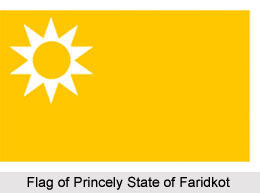 The Princely State of Faridkot was one of the well known 11 gun salute states of India that was administered by a native prince under the guidance of the British authorities. The princely state was under the indirect control of the British Empire in India. Faridkot State covered a total area of 638 sq miles and comprised of a total population of 199,283 in the year 1941. Faridkot state was the westernmost princely state in the Punjab, which was bounded by the British district of Firozpur, excluding borders with territories belonging to Patiala on the east and south. A large block of Nabha state was enclaved in southern Faridkot. The Princely State of Faridkot included 167 villages and 2 towns. Faridkot state was incorporated as a part of the Punjab States Agency.
The Princely State of Faridkot was one of the well known 11 gun salute states of India that was administered by a native prince under the guidance of the British authorities. The princely state was under the indirect control of the British Empire in India. Faridkot State covered a total area of 638 sq miles and comprised of a total population of 199,283 in the year 1941. Faridkot state was the westernmost princely state in the Punjab, which was bounded by the British district of Firozpur, excluding borders with territories belonging to Patiala on the east and south. A large block of Nabha state was enclaved in southern Faridkot. The Princely State of Faridkot included 167 villages and 2 towns. Faridkot state was incorporated as a part of the Punjab States Agency.
The Princely State of Faridkot was honoured as one of the salute states of India with a gun salute of 11 guns. The native ruler of the state, who held the title of Raja, supervised all branches of the administration and well as judiciary functions. The ruler exercised full civil and criminal jurisdiction, excluding over capital cases involving his own subjects. The state of Faridkot retained the right to mint its own currency.
History of Princely State of Faridkot
The princely state was founded in the year 1763, and was reigned over by a Jat Sikh Brar dynasty. The Barar Jat dynasty was the ruling family of the region. During the rule of the Mughal Emperor Akbar, Bhullun Singh provided eminent services and attained great influence. Kapur Singh, his nephew, constructed the Kot Kapura fortress and merged the family holdings. Jodh Singh, his grandson, was compelled by relatives to split family possessions. In the year 1763, Hamir Singh was appointed the first autonomous chief of the princely state of Faridkot. Faridkot state was seized by Ranjit Singh of Sikh Empire in the year 1803 but was returned to the previous rulers in 1807 on the request of the British authorities. In the year 1845, the native ruler supported the British Government of India against the Sikhs and was rewarded with Kot Kapura and other regions that were confiscated from the princely state of Nabha. The last raja in 1947 was the 17th in his line since Bhullun Singh. The state of Faridkot was ranked 13th in order of precedence among the Punjab states.
As the native ruler supported the British troops during the Sepoy Mutiny in 1857, the princely state was accorded an 11 gun salute as per the rules of precedence in the Imperial Durbar. Faridkot state independently issued postage stamps from the year 1879 to 1887, when the province signed a postal convention with the British Empire in India. After the withdrawal of the British and the independence of India on 15th August 1947, the native ruler acceded his state to the newly formed Union of India, also known as the Dominion of India.
Rulers of Princely State of Faridkot
The chronology of the native rulers of the princely state of Faridkot are mentioned below-
* Bhallan
* Chaudhuri Kapura Singh (1643- 1708)
* Chaudhuri Sajja Singh (1708- 1710)
* Chaudhuri Sukha Singh (1710- 1731)
* Chaudhuri Jodh Singh (1731- 1763)
* Sardar Hamir Singh (1763- 1782)
* Sardar Mohr Singh (1782- 1798)
* Sardar Kharat Singh (1798- 1804)
* Sardar Dal Singh (1804)
* Sardar Ghulab Singh (1804- 1826)
* Sardar Attar Singh (1826- 1827)
* Sardar Pahar Singh (1827- 1846)
* Raja Pahar Singh (1846- 1849)
* Raja Wazir Singh (1849- 1874)
* His Highness Farzand i-Sadaat Nishan Hazrat i-Kaisar i-Hind Raja Vikram Singh Brar Bans Bahadur (1874- 1898)
* His Highness Farzand i-Sadaat Nishan Hazrat i-Kaisar i-Hind Raja Balbir Singh Brar Bans Bahadur (1898- 1906)
* His Highness Farzand i-Sadaat Nishan Hazrat i-Kaisar i-Hind Raja Brijindar Singh Brar Bans Bahadur (1906)
* His Highness Farzand i-Sadaat Nishan Hazrat i-Kaisar i-Hind Raja Balbir Indar Singh Brar Bans Bahadur (1906- 1918)
* His Highness Farzand i-Sadaat Nishan Hazrat i-Kaisar i-Hind Maharaja Balbir Indar Singh Brar Bans Bahadur (1918- 1918)
* Liutenant His Highness Farzand i-Sadaat Nishan Hazrat i-Kaisar i-Hind Maharaja Sir Harindar Singh Brar Bans Bahadur KCSI (1918- 1989)



















